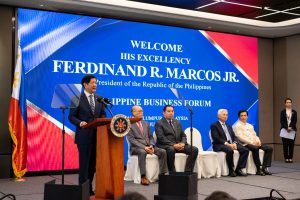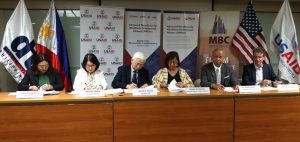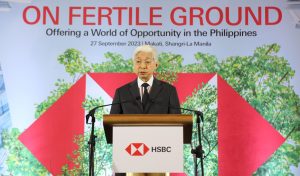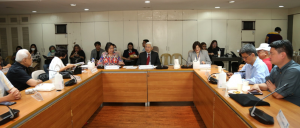
SAN FRANCISCO, CALIFORNIA–On 16 November 2023, Department of Trade and Industry (DTI) Secretary Fred Pascual outlined the Philippine’s sustainable initiatives to address climate change through renewable energy (RE) and innovative plastic recycling during the Asia-Pacific Economic Cooperation (APEC) Philippines Sustainability Roundtable held at Ritz-Carlton Hotel.
Secretary Pascual underscored, “Our agenda is set against the backdrop of escalating global climate crisis is both urgent and transformative. In the Philippines, our resolve is unyielding. We are participants in the dialogue on climate change and proactive architects of the sustainable future with renewable energy and robust recycling systems forming the twin pillars of our strategy.” ”
During the discussions, the DTI chief presented the country’s strategic direction in advancing sustainable initiatives focused on increasing renewable energy (RE) generation and addressing plastic pollution, aligned with the Strategic Investment Priority Plan (SIPP).
Acknowledging the unintended contribution of economic growth to the plastic pollution crisis, he highlighted the government, academia, and civil societies’ active pursuit of waste management solutions through studies, consultations, and awareness campaigns. The Trade and Industry Secretary also laid out the established comprehensive legislations to address plastic pollution including the Ecological Solid Waste Management Act of 2000 and the National Plan of Action for the Prevention, Reduction, and Management of Marine Litter. He added that in 2023, the Philippines fortified its defenses against plastic pollution with the landmark of “Extended Producer Responsibility” (EPR) law.

Secretary Pascual underscored that through multi-sectoral approaches, the enactment of the EPR law become possible, which he described as a major step forward. He explained that the EPR law mandates plastic packaging producers to manage their product lifecycle, including waste management fostering a culture of corporate accountability and environmental stewardship. He further stated that the law also encourages producers to engage in recovery schemes, establish waste collection hubs, and collaborate with Local Government Units (LGUs) to set up recycling centers, lessening the burden on the latter and fostering collective action against plastic pollution.
The DTI chief also highlighted the Philippine Energy Plan as the framework of the country’s strategic direction aiming for a substantial increase in renewable energy capacity. Additionally, he cited the nation’s ambitious goals, targeting a 35% share in RE generation by 2030 and scaling up to 50% by 2040.
Further, the trade and industry chief acknowledged the government’s resolute legislative support, particularly Executive Order Number 18 and the CREATE Law, aimed at attracting foreign investments by providing incentives and streamlining regulations with green energy objectives. Supported by incentives outlined in the CREATE Act, these measures offer an enabling business environment dedicated to advancing the country’s sustainability goals.
Affirming the Philippines’ commitment to sustainable practices, Secretary Pascual urged potential investors and stressed, “We invite investors to join us on this transformative journey towards a sustainable and green future for all. Together, let us forge a path where economic growth, technological innovation, and environmental stewardship intersect, ensuring a legacy of sustainability for generations to come.” ”
The APEC Philippines Sustainability Roundtable brought together the District Export Council of Northern California and Bay Area companies, focusing on renewable energy (RE) and sustainability, particularly those with operations in the Philippines. The discussion was moderated by Rod Hirsch, U.S. Commercial Service-Oakland, US Department of Commerce. ♦
Date of Release: 20 November 2023






